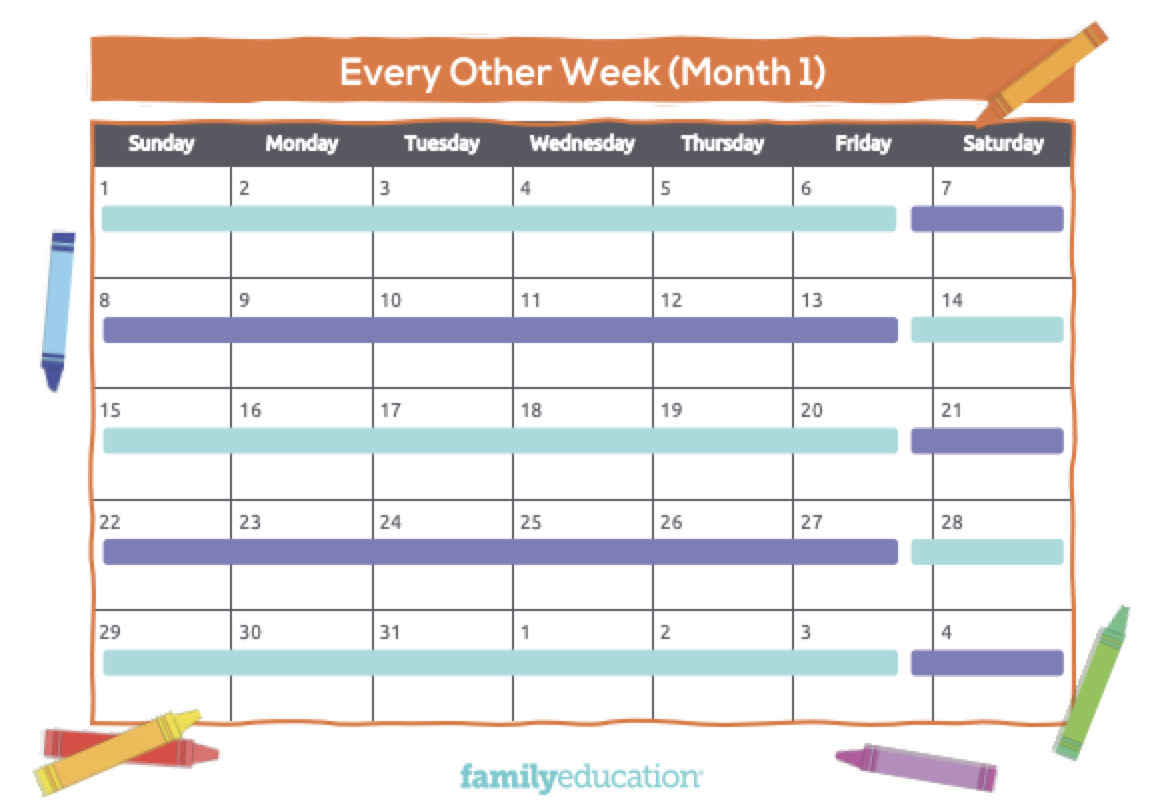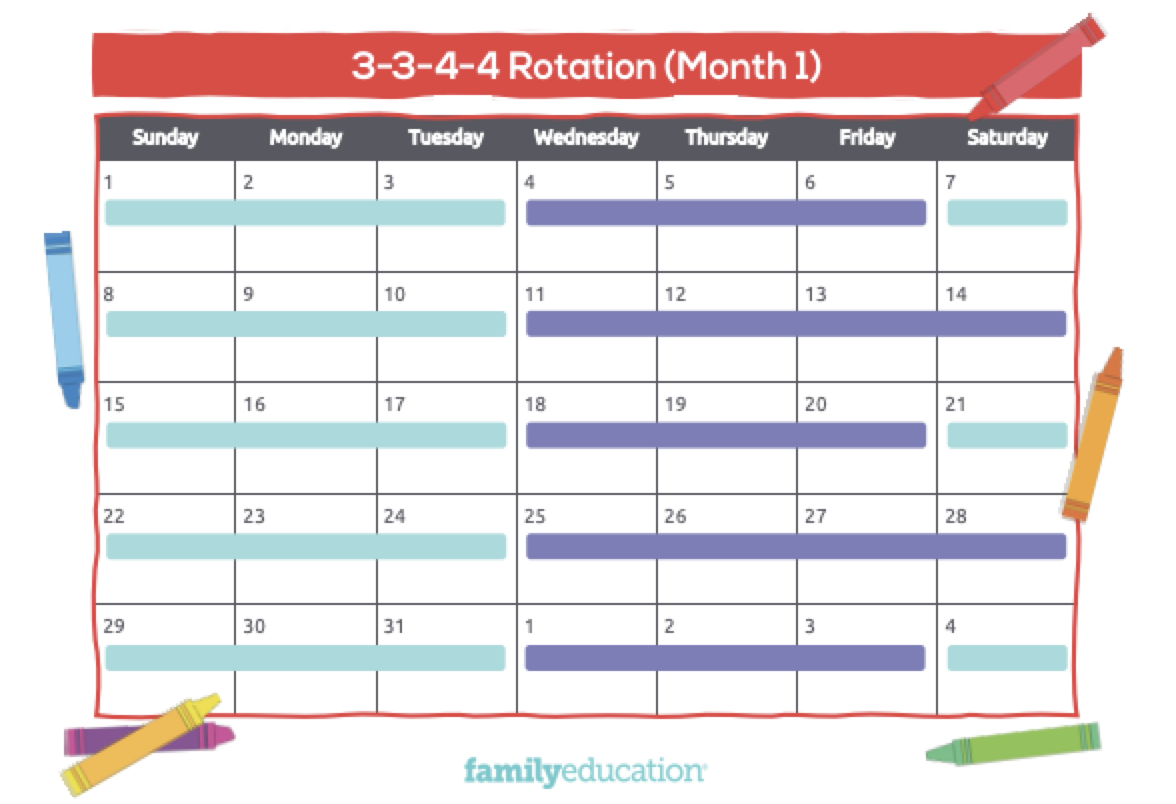
How to create a custody calendar to schedule visitation and holidays after divorce. Plus, free printable custody calendar!

If your family is a split-parent one, you understand all too well the trials and tribulations that come with planning significant events and holidays. Even in homes where both parents live under the same roof, poor communication and scheduling can lead to arguments, mistakes, and confusion.
If you’re sharing your parenting time with a co-parent or ex-spouse, you must work together to create a parenting plan with the best interests of the children in mind. If you have a court order for visitation or an official custody agreement on the amount of time each parent is supposed to spend with the children, it is crucial that it be followed to the letter, or there could be custody issues down the road.
Even in best-case scenarios where the parent's relationship is amicable and friendly, having an unofficial custody schedule worked out prevents confusion and provides stability and predictability for the children.
Children, especially young children, thrive on routine and expectations. Therefore, parents or guardians should address significant changes as soon as possible so the children can process the change and ask any questions they have.
If you have an unreliable co-parent who tends to cancel or change the visitation schedule at the last minute, it may be best to stop telling your children when they are scheduled to see that parent. That way, you prevent continual disappointment and confusion.
The main thing to remember is communication. The more open the communication, even if it is frosty, the less confusion and, therefore, fewer arguments. Second, all major decisions should be made out of earshot, particularly concerning younger children.
It is always best when parents present a united front. You can certainly listen to their opinions on joint custody arrangements if you have older children or teens, but ultimately the decision is up to the parents and or the family court.
For some examples of a custody schedule calendar and planner, see our free printable: Custody and Visitation Calendar for Divorced Parents.
There are dozens of ways to create a custody agreement or schedule, but remember, adults should always complete decision-making with the child's best interests in mind.

Perhaps the most popular arrangement co-parents make is every other week or every other weekend arrangement. Children typically stay with Parent A for one week and then switch to Parent B the following week. You may choose Sunday through Saturday night or Monday through Sunday. This works well if both parents live close by and can accommodate the children’s school schedule and extracurricular activities.
Another option, particularly if parents have a bit of distance between them, is that the child spends the weeks with Parent A and weekends with Parent B. Perhaps add additional time with Parent B over winter, spring, and summer break.

A third option is the 3-4 schedule. This means Parent A has the children for three days; then Parent B takes them for four. Then, the following week you switch, and Parent A has them for four days. This schedule style can become tricky because it requires remembering what week you’re on so you don’t miss Bety’s soccer practice or Ahmed’s piano lesson.
You can break down the 3-4 four schedule in different ways; it could also be done 5-2, 3-2-2, 2-3-2, or it could stay solid that Parent A has them every Sunday through Wednesday and Parent B Thursday through Saturday.
A final option would be alternating days. This works best if both parents live close to each other and you have older children. Alternating days can be confusing for younger children unless they
stay in the same home, and parents alternate in and out.
A new trend is for the family home to stay where the children live and both parents to have their own home or apartment for when they don’t have the kids. But, of course, this arrangement takes some financial backing.
If your co-parenting situation is one where one parent lives far away, several hours by car, or even requires a plane or train ticket, your best bet may be that your children spend the school year with one parent and breaks with the other.
That might mean your child is traveling every winter break, spring break, and summer vacation to see their other parent.

In addition to your regular custody schedule, parents must consider how they will handle major holidays. Things like Christmas Day, New Year’s Eve, your child’s birthday, Easter, Ramadan, Rosh Hashana, Hanukkah, etc., should all be decided well in advance.
Even more minor holidays like Halloween, Fourth of July, Memorial Day, and days the schools are closed like Labor Day, Martin Luther King Jr. Day, President’s Day, and so on should be discussed and planned.
Before you create a parenting schedule that addresses major dates, write down a list of holidays or days that are important to you. For example, perhaps you are more religious than your co-parent, so it is important for you to have the children for religious holidays. Or maybe Mother’s Day is meaningful in your family, so you’d like to see your children every Mother’s Day even if it doesn’t fall on your weekend.
The simplest way to handle major holidays is flip-flopping. This is what we do in my home. One year I have the kids for Thanksgiving, New Year’s Eve, and New Year’s Day, and their Dad has them for Christmas. Then the following year, we switch.
Because we’re pretty relaxed, we often discuss when exactly drop off, or pick-up will happen leading up to the holiday.
Some families have it written into their custody agreement with very explicit directions. So, for example, it may read on odd-numbered years, Parent A has custody of the children from 6 PM, on Christmas Eve, to 3 PM on Christmas Day, and on even number years, Parent B has custody of the children from 6 PM, on Christmas Eve, to 3 PM on Christmas Day.
This method is simple and effective if you’re looking for a no-stress option. For example, does Halloween fall on a day you’re scheduled to have kids? Great! Then they’re with you for Halloween!
Of course, if you have an amicable relationship, you can always invite the other parent to come along trick-or-treating or have Christmas dinner with you, etc.

If you are struggling through a complex custody case or having to use family law to hash issues out, it can make decisions about child custody more challenging. This is especially the case if one parent fails to pay child support owed, has a history of drug or alcohol abuse, or has committed domestic violence.
Even though it may break your heart not to allow your child to see their parent if there has been exposure to drugs, alcohol, or violence, you must put your and your child’s well-being first and perhaps even petition for full legal custody.
Depending on the situation, you may be able to allow for supervised visitation on parents’ birthdays, Mother's or Father’s Day, or other special occasions.
A parenting schedule should include both parents' telephone numbers and addresses. If possible, you should also teach both sets of numbers and addresses to your children. You should also include an emergency contact who has permission to pick up or be with the minor child.
The plan should clearly outline who has custody of the children and when and include a contingency for changes due to emergencies.
Your plan should include who has the children on holidays and school breaks and who is responsible for children in the event of a sick day or unscheduled school closure such as a snow day. It should also include details about vacations and relocation.
A solid parenting plan includes child support amounts, who is responsible and for how long, and lifestyle expectations such as discipline, diet, and access to electronics.
The plan should outline who is responsible for the child’s medical care financially and who can make decisions regarding their care and which parent is responsible for carrying their medical insurance.
In some situations, you may also wish to include who is responsible for paying for extracurricular activities and transportation to and from these activities.
Lastly, if it is important to you or your co-parent, it should include any cultural or religious traditions and holidays that your children should observe.
Keep in mind parenting plans can always be revisited and adapted if needed, and both parents are willing to co-operate. No matter the situation between you and your co-parent, your goal as a parent, is always to put your children first.
Download our Custody and Visitation Calendar to make co-parenting easier than ever!